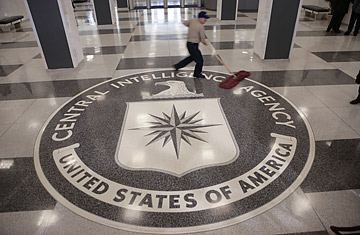
The logo of the U.S. Central Intelligence Agency is swept clean in the lobby of the CIA headquarters in Langley, Virginia.
(2 of 4)
The politicians appear to be listening. The White House, which had opposed the creation of the commission out of fear of a politically damaging verdict on its pre-9/11 performance, gingerly welcomed the panel's proposals, then quickly seized the opportunity to champion reform. Bush has asked chief of staff Andrew Card to head a working group to look at how to best assess and carry out the recommendations. The Administration has been cool to the panel's proposal, long debated in intel circles, that a National Intelligence Director (NID) oversee all 15 intelligence agencies, including the CIA, Defense Intelligence Agency and National Security Agency. But after John Kerry declared that "when I'm President, it's going to happen," Bush aides hinted that Bush too may back the idea of a new intelligence czar. "Nothing's off the table," says a senior White House official. "And it's definitely not off the table before the election."
Between now and then, much of the pressure to take action will come from the 10 commissioners, who plan to flood congressional hearings and stump for their reforms in the heartland. Kean told TIME that the panel hopes to release at least four additional staff-written reports, on such topics as aviation and border security and terrorist financing. Since some contain classified documents interested parties may have to first sue the government to see them. But the gentility with which lawmakers treated the commission since the release of its report seems to be evaporating. The panel's call for streamlining the number of congressional intelligence committees and eliminating limits on their members' length of service--in the name of developing a pool of specialists in Congress who can challenge the analyses of the intelligence community--has already provoked grumbling from House Republican leaders. The push to create a new intelligence czar, meanwhile, may run aground at the Pentagon, which has made clear it doesn't like the prospect of surrendering its considerable authority over how intelligence resources are allocated. In March, Defense Secretary Donald Rumsfeld warned the commission that consolidating authority over the myriad intelligence agencies "would be doing the country a disservice." The bottom line, says Jeffrey Smith, who served as the CIA's top lawyer for part of the Clinton years, is that "major reform is needed, but my sense is nothing will happen this year."
Even if the panel's recommendations are acted upon, would it make a difference? Could such changes actually enable the intelligence community to uncover and prevent the next 9/11? Backers of the panel's call for a single NID say the move would reduce the bureaucratic logjams that have contributed to the intelligence community's string of failures, from its inability to track the hijackers before 9/11 to the fruitless hunt for bin Laden to the missing weapons of mass destruction (WMD) in Iraq. "You need someone who can give orders," says Lawrence Korb, a former Assistant Defense Secretary, "telling the NSA to focus its wiretap on a specific target, the CIA to focus its human intelligence there and the [National Reconnaissance Office] to focus [its] satellites there. That's not happening now."
